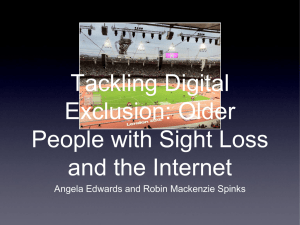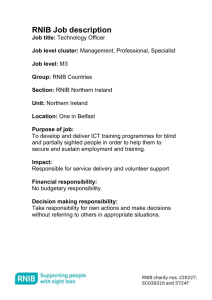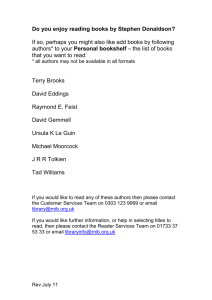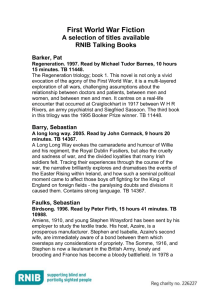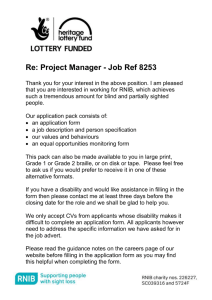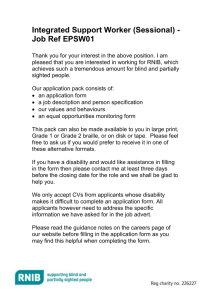Emotional support for children and young people
advertisement
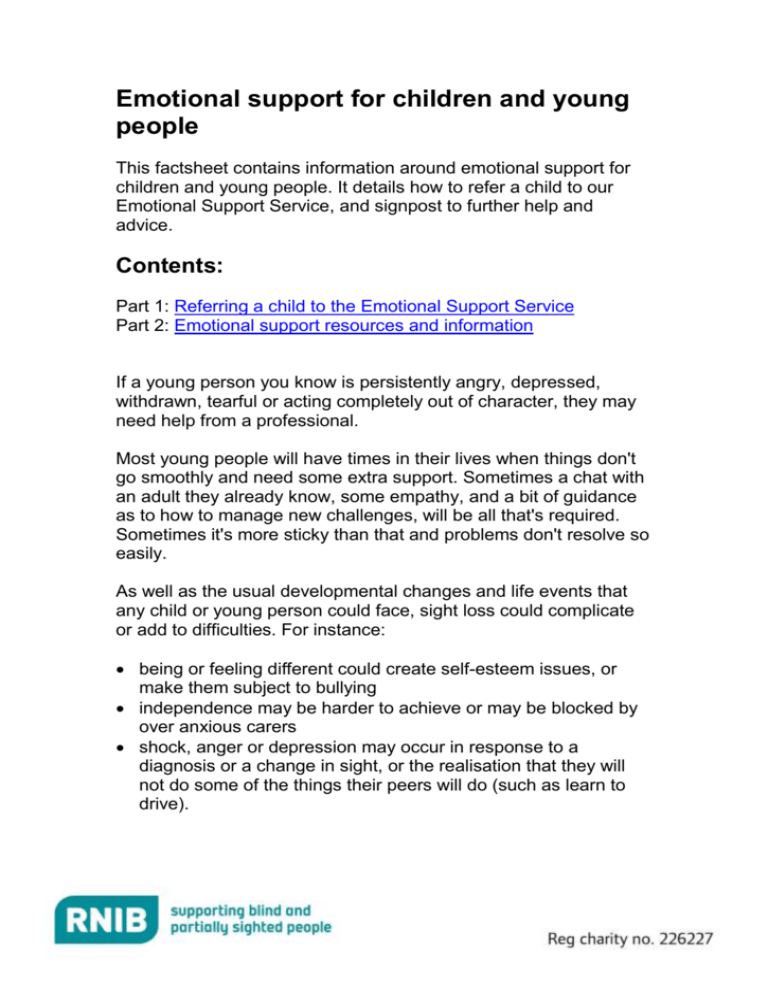
Emotional support for children and young people This factsheet contains information around emotional support for children and young people. It details how to refer a child to our Emotional Support Service, and signpost to further help and advice. Contents: Part 1: Referring a child to the Emotional Support Service Part 2: Emotional support resources and information If a young person you know is persistently angry, depressed, withdrawn, tearful or acting completely out of character, they may need help from a professional. Most young people will have times in their lives when things don't go smoothly and need some extra support. Sometimes a chat with an adult they already know, some empathy, and a bit of guidance as to how to manage new challenges, will be all that's required. Sometimes it's more sticky than that and problems don't resolve so easily. As well as the usual developmental changes and life events that any child or young person could face, sight loss could complicate or add to difficulties. For instance: being or feeling different could create self-esteem issues, or make them subject to bullying independence may be harder to achieve or may be blocked by over anxious carers shock, anger or depression may occur in response to a diagnosis or a change in sight, or the realisation that they will not do some of the things their peers will do (such as learn to drive). RNIB – supporting blind and partially sighted people Registered charity number 226227 RNIB Emotional Support Service (ESS) The Emotional Support service is for children and young people aged 11 to 18, who have sight loss. If a child or young person you know needs to speak with a professional, you can let them know about this telephone based service. Emotional support resources and information You can find details of useful resources and information for teachers, teaching assistants and other professionals working in education in relation to supporting the social and emotional needs of young people. RNIB Young people's web pages: Tough times and emotional support Please encourage any young people you work with to visit our new Young People's section. These web pages are specifically for blind and partially sighted young people which offer advice and guidance on all stages of their transition from choosing school subjects, planning for the future and study advice to starting college and university or moving into employment (including information around work experience, volunteering, interview skills and CV writing). The young people's section has been co-designed and reviewed by young people across the UK and includes information on leaving home, as well as tough times and emotional support, free time activities, technology and more. Young people have told us their stories and experiences of all aspects of transition, incorporating written, video and audio case studies. Part 1: Referring a child to the Emotional Support Service About the RNIB Emotional Support Service The Emotional Support service is for children and young people age 11 to 18 - who have sight loss. If a child or young person you rnib.org.uk know needs to speak with a professional, you can let them know about this telephone based service. What might a young person experience? Any young person experiencing sight loss may be finding the additional issues hard to cope with. A number of things may come up for them: Why me? How will I cope in school? How will I cope in the future? Why don't others understand my needs? Am I so different? These on-going questions are additional to the other issues that many teenagers face (and can make it all the harder): Low self esteem Feeling different but desperate to fit in Seeking individuality Learning to deal with feelings and emotions Speaking with a professional about these issues - someone who also understands sight loss and the added issues that can arise can help support them through this process. The effects of sight loss The effects of sight loss can arise at any time, so for example a young person who has been visually impaired since birth could still be impacted by their sight loss later, perhaps when others of their age group are becoming more independent, learning to drive, travelling around more independently, going on dates! These situations may highlight differences that they hadn't come across before. It may be that you've noticed a child who has become more withdrawn from their friends, or a child that appears angry at the world. They may be asking questions about their sight loss and about coping in the future. rnib.org.uk How to refer a child or young person to RNIB Emotional Support Service A child or young person (or you with their permission) can call our service and arrange a call back from one of our counsellors, who will explain the service and agree a number of sessions with them. This is done by calling our Helpline on 0303 123 9999 and asking to be referred to ESS. You will be put through to the Advice team who will take details and pass them to us. We can also be contacted by email: ess@rnib.org.uk If you wish to find out more about the service, or to decide if a referral is appropriate, you can use the same contact methods and one of our counsellors will call you to offer some information or consultancy. Please remember to provide us with a daytime telephone number. Referring a child or young person to the service You can refer a child or young person to our service. Our referral form can be downloaded at our Guidance on teaching and learning section. A young person may also wish to self refer, we have created a leaflet for young people, explaining the service and how it can support them. This can be downloaded at our Guidance on teaching and learning section. Finding a safe space The whole service is conducted over the telephone, so you may need to help the young person find a safe place where they won't be disturbed. This may be in an office at school, or in a room at home so long as it is safe, private and they have access to a telephone. Like adults, children and young people sometimes need a confidential space to explore issues without necessarily involving parents or carers - as with adults this may be done initially to safeguard their loved ones from worry. The law recognises the rights of young people to seek help for themselves in this way and our counsellors follow clear and widely accepted procedures when working with young clients in this way (See 'Fraser guidelines' section below). We therefore do not require parental consent to rnib.org.uk provide a service, but will always discuss this with the young person in an appropriate way, and support them to share if they want to and can. We also adhere to RNIB safeguarding procedures for vulnerable children and adults in all cases. Support on a one off basis Children and young people with sight loss, who would like to speak with a counsellor on a one off basis, can be referred to us. Weekly sessions may not be necessary, but occasionally when a situation feels unmanageable they may wish to talk it through with someone who understands the added issues of sight loss. Fraser Guidelines These are the legally accepted guidelines for assessing young people's competence to agree by themselves to receiving a "treatment" (which includes counselling). For more information on these guidelines visit the NSPCC website. RNIB's Emotional Support Service adhere to these guidelines and assess each client under 16 on a case by case basis as to whether they are meaningfully able to consent to taking part in counselling. As explained in our 'Finding a safe place' section above, this is done in order to give young people confidentiality. Consideration is always given to whether it is appropriate to involve a parent/carer and the guidelines cover this. When working with young people we always explain the necessary limits of confidentiality (to prevent harm and keep them safe) just as we do with adult clients. For further information and advice, please email ess@rnib.org.uk Part 2: Emotional support resources and information Here you can find details of useful resources and information for teachers, teaching assistants and other professionals working in education in relation to supporting the social and emotional needs of young people. Resources rnib.org.uk Different Horizons - Information and resources for counsellors working with clients who are blind or partially sighted This guide will be of interest and value to counsellors (and other professionals) working with young people in a variety of settings, not only 'specialist' services, and will encourage further dialogue, debate and sharing of learning. This document is presented in two distinct sections: Part One explores sight loss from societal, counsellor and client perspectives, including a narrative discourse based on both qualitative and quantitative data collected over the last three years. It is hoped this will help you think about the possible emotional responses to sight loss and to provoke thought about a client group who you might be unfamiliar with. Part Two offers more practical information and guidance on making counselling accessible to clients who otherwise may never 'appear' in the counselling room; how reduced vision could impact on the therapeutic relationship; a resource section; background and statistical information; and suggestions for further reading and research. You can download your copy of the Different Horizons guidance at our Guidance on teaching and learning section. Gillick competency and Fraser guidelines These are the legally accepted guidelines for assessing young people's competence to agree by themselves, to receiving a "treatment" (which includes counselling). For more information on these guidelines visit the NSPCC website. Promoting resilience and well being in Children and Young People with Sensory Impairment - NatSIP (2012) Given the critical influence of resilience and well-being in personal and social development, learning and employment, it is important to consider how resilience and well-being can be promoted and the outcomes of intervention demonstrated in any planning process for CYP with SI, including Education, Health and Care Plans. This guidance has been developed by a NatSIP working group of specialists in hearing, vision and multi-sensory impairment. It rnib.org.uk builds upon and complements an earlier NatSIP (2010) document entitled: 'Promoting Emotional Resilience'. For further information see our ‘Guidelines and quality standards in education document’ at our Maintaining quality provision section. Useful Organisations Get Connected Get Connected is a free helpline for young people, who know they need help but don't know where to find it. (This service is not specific to young people with sight loss.)Get connected can contact this service by phone, email and webchat any day of the year. CALM (Campaign Against Living Miserably) CALM is a website and helpline particularly aimed at young men and the things that concern them. It recognises that they don't always find it easy to talk about emotional difficulties and aims to fill the gap and reduce suicide and self-harm amongst this group. Kidscape Kidscape has been established specifically to prevent bullying and child sexual abuse. Kidscape works UK-wide to provide individuals and organisations with practical skills and resources necessary to keep children safe from harm. The Kidscape staff equip vulnerable children with practical non-threatening knowledge and skills in how to keep themselves safe and reduce the likelihood of future harm. Kidscape works with children and young people under the age of 16, their parents/carers, and those who work with them. Childline Childline is a 24 hour confidential helpline (0800 1111) for children and young people to speak about anything - big or small - that concerns, stresses or worries them. They can speak as a one-off, or arrange a series of sessions with the same counsellor. They can also do this via webchat. rnib.org.uk Childline is part of NSPCC which is a resource for any adult who has concerns about a child. You can ring their 24 hour helpline for a consultation (0808 800 5000) Changing Faces Changing Faces works with anyone who has a disfigurement and the parents, carers and professionals. It may be useful for a child or young person who feels they look different because of their eye condition. RNIB Young People's section If you work with a young person, you may wish to show them the RNIB young people's section. Our new Young people's section offers advice and guidance for blind and partially sighted young people aged from 14 to 25 on all stages of their transition from school, to college, university and into employment. It has been codesigned and reviewed by young people across the UK and includes information on emotional support, as well as leaving home, free time activities, technology and more. Young people will find written, video and audio case studies from other young people. rnib.org.uk
